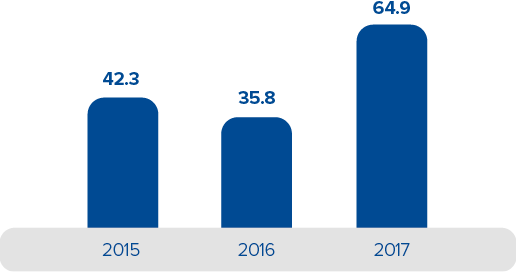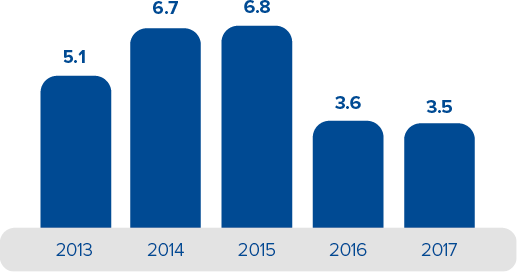Environmental Protection Programme
Ensuring environmental sustainability across all segments of its business remains an unchanged priority of PJSC Aeroflot. Governed by the precautionary principle, the Company seeks to prevent any potential environmental impacts even where there is no definitive science to prove that any particular activity is harmful to the environment. The Company’s environmental policy is aimed at improving the energy efficiency and environmental performance of its products – air transportation of passengers, baggage, cargo, and mail. Aeroflot places special emphasis on improving fuel efficiency of its aircraft fleet, which helps reduce its environmental footprint and cut fuel costs, a major operating expense item.
Aeroflot sets itself the following key environmental sustainability objectives:
- maintain an environmental management
- upgrade its aircraft fleet, replace outdated energy-intensive types of aircraft with new assets offering enhanced fuel efficiency
- introduce resource-saving processes and technologies
- optimise the route network and roll out new piloting techniques to reduce noise pollution and cut emissions from aircraft engines
- manage waste with a focus on recycling to minimise the environmental impact
- identify and benefit from new opportunities to improve environmental performance
- include environmental performance indicators in the supplier and contractor selection process
- raise environmental awareness and promote resource efficiency among PJSC Aeroflot’s employees.
In pursuance of Executive Order of the President of the Russian Federation No. 889 On Selected Measures to Improve Energy and Environmental Efficiency of the Russian Economy dated 4 June 2008, the Company continues to implement its Energy Saving and Environmental Performance Programme until 2020 providing for a 42% decrease in specific fuel consumption across the fleet by 2020 from the 2007 rate.
PJSC Aeroflot’s total environmental protection expenses increased year-on-year to RUB 64.9 million in 2017 due to the paint shop renovation at the Aircraft Technical Service Department (procurement and instalment of new gas cleaners and a paint booth), and the replacement of filter caps at the Melkisarovo office building treatment facilities.
In accordance with the applicable environmental laws, PJSC Aeroflot pays environmental fees which totalled RUB 3.5 million in 2017.
The Company also paid fines of RUB 485,000 for violating environmental laws in 2017.
Quality management system
PJSC Aeroflot has in place an integrated management system with the quality management system (QMS) as its core element. For many years, PJSC Aeroflot’s QMS has successfully passed certification audits under ISO 9001 (Quality Management System) and registrations under the IATA’s industry programmes (IOSA – Operational Safety Audit, ISAGO – Safety Audit for Ground Operations).
Efforts to improve the QMS are aligned with activities to further improve the assessment framework for KPI-based evaluation of performance and progress on the implementation of internal and external QMS standards applied by the IATA, SkyTeam, and Aeroflot Group.
In February 2017, PJSC Aeroflot’s integrated environmental management system successfully passed a re-certification audit. The audit was carried out by TÜV Rheinland Russia, a branch of the world’s leading certification agency, and looked at compliance with ISO 9001:2015 (Quality Management Systems) and ISO 14001:2004 (Environmental Management Systems).
The compliance audit revealed no critical instances of non-compliance and confirmed that PJSC Aeroflot’s integrated management system met the international standards ISO 9001 and ISO 14001.
In May 2017, Aeroflot airline successfully passed the IATA Operational Safety Audit for IOSA compliance for the seventh time. The IOSA certificate and operator status were extended until October 2019.
Fuel efficiency and air quality initiatives
PJSC Aeroflot is implementing environmental impact mitigation initiatives: almost all of its fleet is in compliance with ICAO standards for noise levels and atmospheric pollution. Fuel efficiency management is one of the Company’s operational priorities as higher fuel efficiency reduces greenhouse gas emissions.
PJSC Aeroflot develops and implements its annual fuel efficiency and cost-cutting programme which has helped PJSC Aeroflot reduce its specific fuel consumption by 9.6% over the past five years, totalling 277.6 grams per tonne-kilometre (TKM) in 2017, while specific СО2 emissions decreased by 9.5% to 875.1 g/TKM.
Fuel efficiency and air quality initiatives
| 2013 | 2014 | 2015 | 2016 | 2017 | |
| Fuel consumption, tonnes | 1,946,846 | 2,028,842 | 2,183,335 | 2,365,190 | 2,588,100 |
| Specific fuel consumption, g/TKM | 307.0 | 301.6 | 299.2 | 286.3 | 277.6 |
| CO2 emissions, tonnes | 6,132,564.9 | 6,390,852.3 | 6,877,505.3 | 7,450,348.5 | 8,152,515 |
| Specific CO2 emissions, g/TKM | 967.4 | 950.7 | 943.5 | 902.8 | 875.1 |
CO2 emissions are fully monitored and recorded throughout the route network in line with the applicable Russian and European laws and regulations. CO2 emissions reporting is guided by national standards and the procedure adopted by the EU Emissions Trading System (EU ETS). In 2017, as part of compliance with the EU ETS requirements, PJSC Aeroflot passed the CO2 emissions verification audit of its 2016 annual report, following which the operational CO2 emissions will be compensated through purchasing missing quotas.
The Company carries out regular fine-tuning of instrumental controls and fuel system to ensure compliance with permitted toxicity and smoke levels. In 2017, the Company also conducted a study of pollutant emissions at the paint facilities of the Aircraft Technical Service Department and the Ground Handling Department, which revealed no excessive emissions above the authorised limit. Furthermore, to mitigate pollutant emissions, the Company conducts regular ventilation system inspections at its operational and office premises.
Carbon Disclosure Project (CDP)
In 2017, PJSC Aeroflot received its first international Carbon Disclosure Project (CDP) rating for disclosures on climate change management and greenhouse gas emissions. Under the CDP, companies from across the globe make standardised reports on their greenhouse gas emissions and on climate change activities. According to the published CDP rating, PJSC Aeroflot was awarded a performance score of D (Disclosure), a good result for a first-time participant. PJSC Aeroflot also mapped out a number of initiatives to be implemented in 2018 to raise its rating.
Today, the rating includes over 800 institutional investors with more than USD 95 trillion under management and is consistently gaining popularity both among investors and companies disclosing their information and seeking to improve their scores.
Sustainable use of water
PJSC Aeroflot is consistently reducing its negative impact on water bodies and ensuring the sustainable use of water. In 2017, PJSC Aeroflot and SPU-1 DZM, a service provider for the Melkisarovo office building, monitored the quantity and quality of wastewater discharged by the building’s treatment facilities, both of which comply with Sanitation Rules and Regulations 2.1.5.980-00 “Sanitation Requirements to Surface Waters Protection”.
During the year, the Company’s specialists monitored the morphometrics of the Klyazma River. In line with the applicable standards, PJSC Aeroflot submitted regular wastewater quality and quantity reports to supervisory authorities in 2017.
Water consumption by PJSC Aeroflot
THOUSAND CUBIC METRES
| 2015 | 2016 | 2017 | |
| Total | 22.0 | 24.1 | 22.0 |
| from public water supply network | 22.0 | 24.1 | 22.0 |
Water discharge by PJSC Aeroflot
THOUSAND CUBIC METRES
| 2015 | 2016 | 2017 | |
| Total | 19.4 | 19.3 | 17.7 |
| including: treated water (surface drains from the site of the office building complex, facilities, and structures) |
2.3 | 1.2 | 1.4 |
| passed to other companies for treatment (sewage) | 17.1 | 18.1 | 16.3 |
Reduced generation and disposal of production and consumption waste
PJSC Aeroflot is working towards reducing its production and consumption waste disposed to landfills and growing the share of waste sent for recycling and disposal. Throughout 2017, PJSC Aeroflot regularly inspected waste storage sites of production and consumption waste, as well as maintained monthly records of generation and movement of production and consumption waste across its business units.
The following documents were prepared and submitted to the environmental authorities:
- 2-TP (waste) and 4-OC statistical reports, submitted to the Federal State Statistics Service and the Central Federal District Department of the Federal Service for Supervision of Use of Natural Resources
- the technical report on the consistency of the production process, materials, and waste management used at the Sheremetyevo site
- the technical report for the Company’s Melkisarovo office building
- the draft standard for waste generation and waste storage limits at the Sheremetyevo site, developed by the Company and approved with the Central Federal District Department of the Federal Service for Supervision of Use of Natural Resources.
The Company runs regular employee workshops on production and consumption waste management. To arrange paper waste sorting, PJSC Aeroflot allocated sites for paper and cardboard waste storage and its subsequent handover for recycling in 2017.
As at the end of the year, the total waste of PJSC Aeroflot increased by 15.2% year-on-year to 26,700 tonnes. No critical industrial spills were registered at PJSC Aeroflot in 2017.
Total waste of PJSC Aeroflot by disposal method
TONNES
| 2015 | 2016 | 2017 | |
| Total: | 21,385.9 | 23,136.9 | 26,660.9 |
| including: | |||
| hazard class 1 | 2.2 | 3.9 | 2.4 |
| hazard class 2 | 1.4 | 6.0 | 6.4 |
| hazard class 3 | 2,448.5 | 2,508.3 | 2,353.4 |
| hazard class 4 | 18,528.3 | 19,926.7 | 23,647.4 |
| hazard class 5 | 405.5 | 692.0 | 651.4 |
Total waste of PJSC Aeroflot by disposal method
TONNES
| 2015 | 2016 | 2017 | |
| Handed over for recycling | 0.0 | 8.1 | 3.9 |
| Handed over for disposal | 2,066.6 | 250.6 | 258.3 |
| Handed over for neutralisation | 12,180.9 | 16,714.2 | 20,542.9 |
| Landfilled | 7,138.4 | 6,164.0 | 5,255.8 |
Energy consumption by PJSC Aeroflot
| Actual consumption | ||
| in physical terms | in RUB ’000 (net of VAT) | |
| Total aviation fuel, tonnes | 2,588,155 | 84,816,468 |
| Heat*, Gcal | 39,732 | 61,765 |
| Electricity*, kWh | 29,836,234 | 111,688 |
| Motor fuel, total, litres | 5,445,147 | 185,948 |
| Aviation lubricants, litres | 247,205 | 180,471 |


